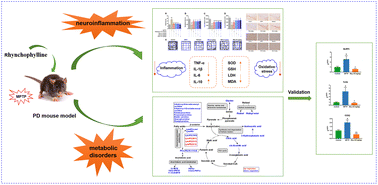Rhynchophylline alleviates neuroinflammation and regulates metabolic disorders in a mouse model of Parkinson's disease†
Abstract
Parkinson's disease (PD) is the second most prevalent neurodegenerative disorder with limited therapeutic agents. Rhynchophylline (RIN), a tetracyclic oxindole alkaloid isolated from Uncaria rhynchophylla, has multiple neuropharmacological activities, including anti-inflammatory, anti-depression, anti-neurodegenerative disease, and anti-drug addiction. Though it is reported that RIN exerts a neuroprotective effect against PD, the underlying protective mechanism remains obscure. In this study, a mass spectrometry-based metabolomic strategy combined with neurobehavioral tests, serum biochemical assays, and immunohistochemistry were employed to decipher the protective mechanism of RIN against 1-methyl-4-phenyl-1,2,3,6-tetrahydropyridine hydrochloride (MPTP)-induced subacute PD in mice. Our results indicated that RIN significantly improved the MPTP-induced behavioral abnormalities, reduced the loss of dopaminergic neurons, and reversed the secretion of inflammatory cytokines and oxidative stress indicators. Further studies showed that RIN significantly suppressed the expression of toll-like receptor 4, NOD-like receptor protein 3, and cyclooxygenase 2 in the mouse striatum. The results of serum metabolomics showed that RIN could ameliorate metabolic disorders in PD mainly through the regulation of retinol metabolism, arachidonic acid metabolism, glycerophospholipid metabolism, and purine metabolism. These pieces of evidence revealed that RIN is a promising drug candidate for PD by alleviating neuroinflammation and maintaining metabolic homeostasis.



 Please wait while we load your content...
Please wait while we load your content...